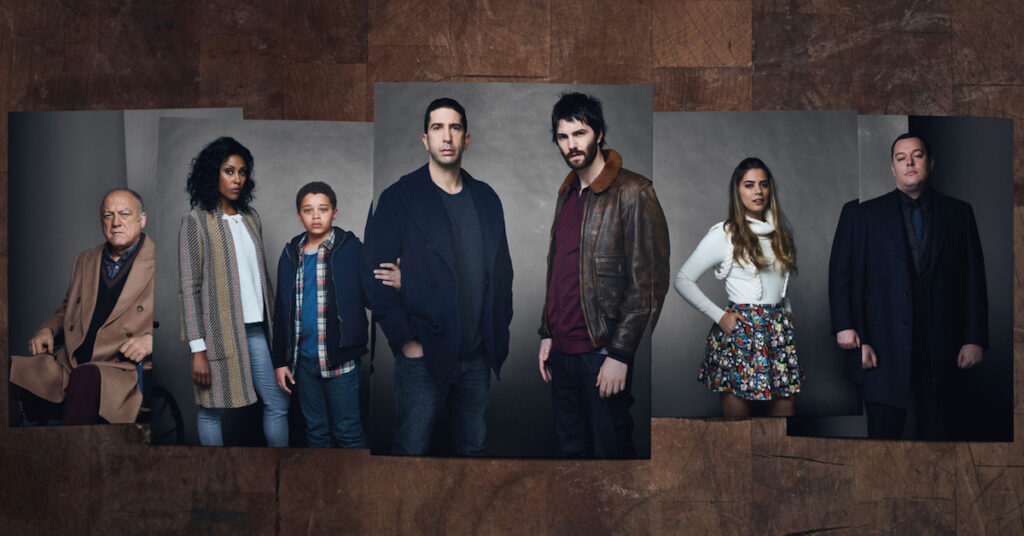There’s something so dispiriting about watching a talented
actor stuck in a bad TV show. We saw earlier this year how much David Schwimmer
can do with the right material, delivering on FX’s “The People vs. OJ Simpson: American Crime Story.”
And yet watching him on AMC’s “Feed the Beast” too often reminded me of a cry
for help. Paired with an actor who can’t deliver what he’s been asked for, and, more importantly, laden with so many “Peak TV Drama” clichés that
it becomes almost a parody of the Golden Age of TV, Schwimmer sometimes looks
like he wants to look at the camera and mouth a phone number to call to be rescued. “Feed the Beast” vacillates from being something we’ve seen
often to something that’s just not believable, and the dialogue sounds produced by a computer designed to write melodrama. Schwimmer (and
co-star Lorenza Izzo) sometimes pierce through the predictability, but everyone
else gets lost in a messy show that just can’t compete in today’s TV market.

Tommy (Schwimmer) is a wine expert on the ropes. His wife Rie
(Christine Adams) was killed in a hit-and-run accident, leaving him a single
father of TJ (Elijah Jacob), who has not spoken since the loss. After the car
accident, Tommy’s best friend Dion (Jim Sturgess), burned down the restaurant
in which they worked, which was owned by a local heavy named the Tooth Fairy (Michael
Gladis). If you’re trying to keep track of all the TV tropes, let me get right
to the summary. Tommy is grieving the death of his wife, struggling to be a
single parent to a mute child, drinks too much of his own wine supply to be
healthy, and, I almost forgot, has a racist, paraplegic father (John Doman).
Dion has a coke problem, violence issues, owes the mob, and even has someone
else (Michael Rispoli) after him to get close to The Tooth Fairy for
justice/revenge. Too much show? Why not throw in a subplot involving a woman
(Izzo) that Tommy meets at his grief meetings? And I haven’t even mentioned that
the narrative of the show really spins around Tommy & Dion trying to open a
restaurant in a bad neighborhood in the Bronx.
“Feed the Beast” is the kind of show in which people are
stunningly self-aware. They say things like “I gotta confess, I’m always
getting into trouble” and “I’m the one who’s been in prison this last year and
you’re the one who’s messed up.” No one talks like this. It is dialogue that
constantly calls attention to itself, and it’s all in service of a plot that feels
manipulative and fake. The show’s writers use grief like a plot device—as another
storm cloud in Tommy’s life and object of threat (he may lose TJ if he doesn’t
get his shit together)—instead of as anything honest or genuine. Overall, the
show is so crowded with various threats from tough guys who pull teeth to
gun-toting grandfathers, but none of them come with any real sense of danger.
Believe it or not, “Feed the Beast” comes alive when it
features actual cooking and discussion of food. It’s likely that the fact that
Dion is an incredible chef was the starting point of the show, the foundation
of its existence, and then everything else was thrown into the recipe at the
last minute, ruining what could have been a pretty good dish about two average
guys trying to make it in NYC. In the end, no one likes overcooked or
undercooked food, and “Feed the Beast” has examples of both. Sturgess
over-acts, Schwimmer often underplays (although I think he’s doing it to
balance a little bit), the whole thing is overwritten and yet has so little
visual language that it feels under-directed. Despite my hope that Schwimmer, a
genuinely underrated actor, could find another critical hit to carry the
momentum from “American Crime Story,” you really need to send this one back to
the kitchen.












